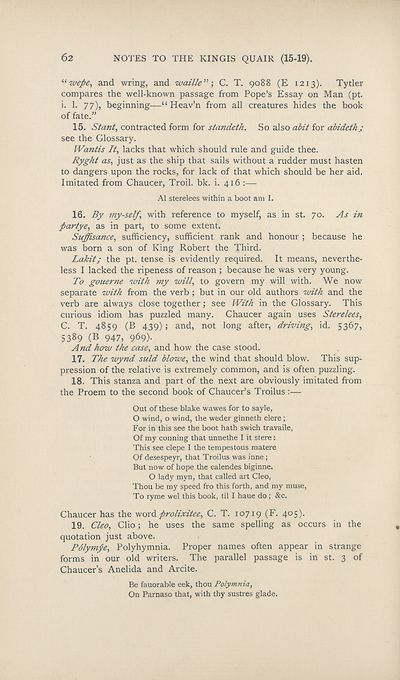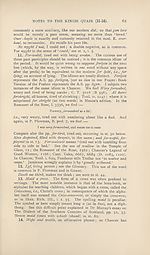Scottish Text Society publications > New series > Kingis quair; together with A ballad of good counsel
(140)
Download files
Complete book:
Individual page:
Thumbnail gallery: Grid view | List view

62
NOTES TO THE KINGIS QUAIR (15-19).
“ wepe, and wring, and waille"C. T. 9088 (E 1213). Tytler
compares the well-known passage from Pope’s Essay on Man (pt.
i. 1. 77), beginning—“ Heav’n from all creatures hides the book
of fate.”
15. Stant, contracted form for standeth. So also abit for abideth;
see the Glossary.
Wantis It, lacks that which should rule and guide thee.
Ryght as, just as the ship that sails without a rudder must hasten
to dangers upon the rocks, for lack of that which should be her aid.
Imitated from Chaucer, Troil. bk. i. 416 :—
A1 sterelees within a boot am I.
16. By my-self, with reference to myself, as in st. 70. As in
ftartye, as in part, to some extent.
Suffisance, sufficiency, sufficient rank and honour ; because he
was born a son of King Robert the Third.
Lakit; the pt. tense is evidently required. It means, neverthe¬
less I lacked the ripeness of reason ; because he was very young.
To gouerne with my will, to govern my will with. We now
separate with from the verb ; but in our old authors with and the
verb are always close together; see With in the Glossary. This
curious idiom has puzzled many. Chaucer again uses Sterelees,
C. T. 4859 (B 439); and, not long after, driving, id. 5367,
5389 (B 947, 969).
And how the case, and how the case stood.
17. The wynd suld blowe, the wind that should blow’. This sup¬
pression of the relative is extremely common, and is often puzzling.
18. This stanza and part of the next are obviously imitated from
the Proem to the second book of Chaucer’s Troilus :—
Out of these blake wawes for to sayle,
O wind, o wind, the weder ginneth clere;
For in this see the boot hath swich travaile,
Of my conning that unnethe I it stere:
This see clepe I the tempestous matere
Of desespeyr, that Troilus was inne ;
But now of hope the calendes biginne.
O lady myn, that called art Cleo,
Thou be my speed fro this forth, and my muse,
To ryme wel this book, til I haue do ; &c.
Chaucer has the word prolixitee, C. T. 10719 (F. 405).
19. Cleo, Clio; he uses the same spelling as occurs in the
quotation just above.
Polymye, Polyhymnia. Proper names often appear in strange
forms in our old writers. The parallel passage is in st. 3 of
Chaucer’s Anelida and Arcite.
Be fauorable eek, thou Polymnia,
On Parnaso that, with thy sustres glade.
NOTES TO THE KINGIS QUAIR (15-19).
“ wepe, and wring, and waille"C. T. 9088 (E 1213). Tytler
compares the well-known passage from Pope’s Essay on Man (pt.
i. 1. 77), beginning—“ Heav’n from all creatures hides the book
of fate.”
15. Stant, contracted form for standeth. So also abit for abideth;
see the Glossary.
Wantis It, lacks that which should rule and guide thee.
Ryght as, just as the ship that sails without a rudder must hasten
to dangers upon the rocks, for lack of that which should be her aid.
Imitated from Chaucer, Troil. bk. i. 416 :—
A1 sterelees within a boot am I.
16. By my-self, with reference to myself, as in st. 70. As in
ftartye, as in part, to some extent.
Suffisance, sufficiency, sufficient rank and honour ; because he
was born a son of King Robert the Third.
Lakit; the pt. tense is evidently required. It means, neverthe¬
less I lacked the ripeness of reason ; because he was very young.
To gouerne with my will, to govern my will with. We now
separate with from the verb ; but in our old authors with and the
verb are always close together; see With in the Glossary. This
curious idiom has puzzled many. Chaucer again uses Sterelees,
C. T. 4859 (B 439); and, not long after, driving, id. 5367,
5389 (B 947, 969).
And how the case, and how the case stood.
17. The wynd suld blowe, the wind that should blow’. This sup¬
pression of the relative is extremely common, and is often puzzling.
18. This stanza and part of the next are obviously imitated from
the Proem to the second book of Chaucer’s Troilus :—
Out of these blake wawes for to sayle,
O wind, o wind, the weder ginneth clere;
For in this see the boot hath swich travaile,
Of my conning that unnethe I it stere:
This see clepe I the tempestous matere
Of desespeyr, that Troilus was inne ;
But now of hope the calendes biginne.
O lady myn, that called art Cleo,
Thou be my speed fro this forth, and my muse,
To ryme wel this book, til I haue do ; &c.
Chaucer has the word prolixitee, C. T. 10719 (F. 405).
19. Cleo, Clio; he uses the same spelling as occurs in the
quotation just above.
Polymye, Polyhymnia. Proper names often appear in strange
forms in our old writers. The parallel passage is in st. 3 of
Chaucer’s Anelida and Arcite.
Be fauorable eek, thou Polymnia,
On Parnaso that, with thy sustres glade.
Set display mode to: Large image | Zoom image | Transcription
Images and transcriptions on this page, including medium image downloads, may be used under the Creative Commons Attribution 4.0 International Licence unless otherwise stated. ![]()
| Publications by Scottish clubs > Scottish Text Society publications > New series > Kingis quair; together with A ballad of good counsel > (140) |
|---|
| Permanent URL | https://digital.nls.uk/113909975 |
|---|
| Description | A collection of over 100 Scottish texts dating from around 1400 to 1700. Most titles are in Scots, and include editions of poetry, drama, and prose by major Scottish writers such as John Barbour, William Dunbar, Gavin Douglas, and George Buchanan. Edited by a key scholarly publisher of Scotland's literary history, and published from the late 19th century onwards by the Scottish Text Society. Available here are STS series 1-3. |
|---|

